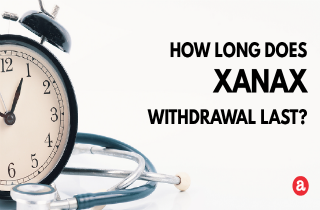How long will Xanax withdrawal last?
Xanax (alprazolam) is a benzodiazepine medication prescribed to treat anxiety, panic disorders, and sometimes depression. Keep in mind that withdrawing from Xanax can be dangerous process, so it’s recommended that you work with a physician to first taper and then stop taking Xanax for good.
Q: Can I just stop taking Xanax?
A: Usually, NO.
In fact, various health concerns need to be taken into consideration when considering Xanax withdrawal so ALWAYS WITHDRAW FROM XANAX UNDER MEDICAL SUPERVISION.
Here, we review how long it takes to withdraw from Xanax and what to expect for the first several weeks off Xanax. We will also discuss the symptoms of Xanax withdrawal that you can expect and what does Xanax withdrawal feel like. We invite your questions about withdrawing from Xanax at the end.
How long until Xanax withdrawal starts?
Once you have decided to stop taking Xanax, withdrawal symptoms can start as early as a few hours after the effect of Xanax has worn off. These first few hours are critical, as several people have been said to experience seizures during this time. For this reason, it is recommended you work with a physician to taper your medication and then monitor withdrawal symptoms. Other common onset symptoms include: insomnia, anxiety, exacerbated anxiety, racing thoughts, and panic attacks. Violent symptoms of Xanax withdrawal include: tremors, paranoid psychosis, dizziness, and speech problems.
Xanax withdrawal time-line
Xanax withdrawal symptoms vary from person to person, as each individual is unique. Plus, other health factors contribute to the withdrawal symptoms. For the most part, however, withdrawal symptoms typically appear several hours after your last dose of Xanax. Then, Xanax withdrawal can last for months after you have stopped taking Xanax. Though we outline a 4 week withdrawal process below, it can take a good deal longer, especially if you are tapering your medication in order to ease the potential severity of the withdrawal symptoms.
24 – 72 hours Xanax withdrawal – During the first hours of Xanax withdrawal, you are at highest risk of seizures. Being monitored might be a good option if you have experience withdrawal seizures in the past or have a history of neurological disorders. In the first days of Xanax withdrawal, you may also experience an increase heart rate, mood swings, and an inability to sleep. You may also suffer nausea and vomiting during this initial phase.
Week 1 Xanax withdrawal – In the first week of Xanax withdrawal, you may notice that increased heart rate continues. Insomnia, racing thoughts, and irritability are also likely to be present. Use of Xanax over time can also exacerbate the anxiety you were being treated for, resulting in “rebound anxiety” issues. Depression and cravings for Xanax can also manifest during this time.
Week 2 Xanax withdrawal – Most of the same symptoms present during Week 1 will cross over into Week 2. Sleep may continue to be a problem. Your moods might still be erratic, but the risk of tremors, seizures and any other difficult situations will have passed.
Weeks 3-4 Xanax withdrawal – Your sleep patterns should be returning to normal in this time. And physical symptoms should begin to lesson. Minor symptoms of withdrawal can still be present, such as sensory sensitivity and agitation. However, psychological symptoms will continue to be a issue, more so for those who have developed an addiction to Xanax.
How long do Xanax withdrawal symptoms last?
Symptoms of Xanax withdrawal can last anywhere from several weeks to several months. But the major withdrawal symptoms present during Xanax detox should resolve within about a month. However, people have reported cases of insomnia, heightened anxiety, and cravings long after the initial 30 days of Xanax withdrawal. And some people have said it can take up to a year before they feel a level of overall normalcy. And keep in mind that previous conditions treated by Xanax are exacerbated by detoxification. This can make withdrawal even longer, adding to your frustration.
Xanax withdrawal treatment programs can help you detox safely and offer therapies and strategies to make it easier for you to stay quit once the medication is out of your system.
Xanax withdrawal: how long?
In general, Xanax withdrawal can last a couple of months. But Xanax affects each person differently, depending on the dosage amount and frequency you’ve been prescribed AS WELL AS how long you’ve been taking Xanax. Each withdrawal period is unique to the person taking Xanax. In general, however, if you taking Xanax as prescribed for appropriate reasons, symptoms of withdrawal tend to be less intense than someone abusing the medication or taking higher doses than prescribed.
Furthermore, many people taking Xanax daily can experience Post-Acute withdrawal syndrome (PAWS), a set of symptoms unique to benzodiazepine class medications. These persistent symptoms occur after discontinued use of Xanax and can last several weeks and months after you last dose of Xanax. Insomnia, depression, anxiety and other mental instabilities are typical of benzodiazepine PAWS symptoms. Psychological effects of addiction and dependence may also still be present long after you are no longer taking Xanax. If this is the case, we encourage you to seek help from mental health specialists.
Questions about Xanax withdrawal
Do you still have questions about Xanax Withdrawal? Please share your questions and experiences with Xanax in the comments section below. And we’ll try to respond to your Xanax questions personally ASAP.









Related Posts